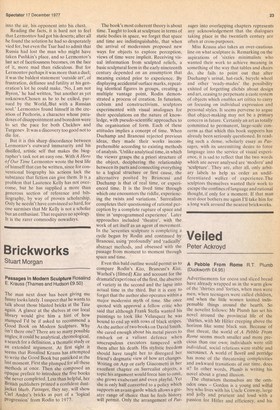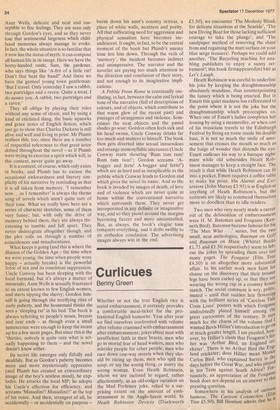Veiled
Peter Ackroyd
A Pebble From Rome R.T. Plumb (Duckworth £4.95) Advertisements for cocoa and sliced bread have already wrapped us in the warm glow of the 'thin ies and 'forties, when men were men, when teenagers were called children, and when the little women knitted indispensable things around the hearth. So the novelist follows: Mr Plumb has set his novel around the provincial life of the 'thirties, with Mr Hiller creeping above the horizon like some black sun, Because of that threat, the world of A Pebble From Rome seems much smaller and more precious than our own; individuals were still individual, social relations were stable and sacrosanct. A world of Bovril and porridge has none of the threatening complexities and awkward transitions of our time, does it? In other words, Plumb is writing his novel about a grand illusion. The characters themselves are the orthodox ones — Gordon is a young and wilful boy who lives with his Uncle Conway, large and jolly and prurient and loud with a passion for Hitler and efficiency, and his Aunt Wells, delicate and neat and susceptible to fine feelings. They are seen only through Gordon's eyes, and so they never lose that sentimental largeness which childhood memories always manage to evoke. In fact, the whole situation is so familiar that it now has the status of myth: it can compose all human life in its image. Here we have the horny-handed rustic, Sam, the gardener, who says things like 'A-frit of a little rat! Don't that beat the band!' And there we have the genteel young town gentleman: 'But I travel. Only yesterday I saw a rabbit, two partridges and a raven. Quite a treat, I do assure you. A rabbit, two partridges and a raven.'
They all oblige by playing their roles without any sense of strain, and by using a kind of etiolated slang, the basic squawks and grace notes of English fiction, which just go to show that Charles Dickens is still alive and well and living in print. Mr Plumb realises this, too, since there are a number of respectful references to that great actor dotted throughout the novel — as if Plumb were trying to exorcise a spirit which Will, in this context, never quite go away. It is a context, of course, which only exists in books, and Plumb has to excuse the occasional awkwardness and literary simplicity of his narrative by reminding us that it is all taken from memory. 'I remember now. . .as I remember' is always the theme song of novels which aren't quite sure of their tone. What we really have here are a series of character sketches, some of them very funny; but, with only the drive of memory behind them, they are always threatening to tumble and fall apart. They never disintegrate altogether though, and the plot rolls on through a number of coincidences and misadventures.
What keeps it going (and this is where the illusion of the Golden Age — the time when we were young, the time when people were happy — actually breaks) is the powerful force of sex and its consistent suppression. Uncle Conway has been sleeping with the local barmaid, but it's always a matter of innuendo; Aunt Wells is sexually frustrated to an extent known to few English women, and starts sipping the sherry; Gordon himself is going through the terrifying rites of early puberty, and the housemaid thinks she sees a 'sleeping rat' in his bed. The book is always referring to people's noses, breasts and rear ends — as though even a small tumescence were enough to keep the steam up for a few more pages. But since this is the 'thirties, nobody is quite sure what is actually happening to them — and the novel doesn't know either.
Its secret life emerges only fitfully and stealthily. But as Gordon's puberty becomes more and more mysteriously oppressive (and Plumb has created an extraordinary image of the. boy's restless mind), he explodes. He attacks the local MP; he adopts his Uncle's affection for efficiency, and screams 'Mussolini!! Mussolini!!' at the top of his voice. And then, strangest of all, he accidentally — or accidentally on purpose — burns down his aunt's country retreat, a place of white walls, neatness and purity. All that suffocating need for aggression and physical sensation here becomes incandescent. It ought, in fact, to be the central moment of the book but Plumb's uneasy tone lets him down. Through the veils of 'memory', the incident becomes indirect and unimpressive. The narrator and the novelist are paying too much attention to the direction and conclusion of their story, and not enough to its imaginative implications.
A Pebble From Rome is continually oscillating, in fact, between the calm and lyrical tone of the narrative (full of descriptions of colours, and of objects, which contribute to that warm glow of the recent past) and passages of strangeness and violence. Sometimes the neat objects and the pastel shades go sour: Gordon often feels sick and his head swims, Uncle Conway drinks far too much and mutters to himself. The book then gets diverted into sexual innuendoes and strange monosyllabic utterances (Uncle Conway starts shouting 'Rum turn turn! Rum turn turn!'; Gordon screams 'A hugger and ferts! A-bugger and ferts!') which are as hard and as inexplicable as the pebble which Conway lends to Gordon and which gives the novel its name. And so the book is invaded by images of death, of love and of violence which are never quite at home within the conventional narrative which surrounds them. They never get incorporated many definite or imaginative way, and so they prowl around the margins becoming fiercer and more uncontrolled. But, as always, the book's elegiac tone conquers everything, and it drifts swiftly to an orthodox conclusion. The advertising images always win in the end.



































 Previous page
Previous page